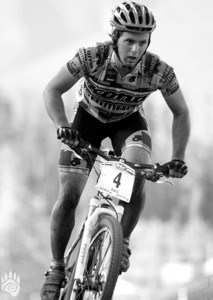
Pedalling his way across deserts, over mountains and through tiny villages, Cory Wallace recently spent six days navigating his way through Morocco during the 10th annual Titan Desert Stage Race.
The Jasperite faced 630 other racers from around the world, including former Tour de France winners, national champions and top European marathon racers.
Wallace got off to a good start during the first stage, sitting just inside the top 10 after two big mountain climbs. On the way down, things got interesting with riders cutting switchbacks, riding across open terrain and doing whatever they could to find the shortest way down the mountain.
“In the first decent I was with a couple of Dutch guys and we were following all the switch backs and all the Spanish guys were cutting straight down the mountain side,” said Wallace, who’s sponsored by Kona, as well as Freewheel Cycle and Wild Mountain.
In a normal race this would be considered cheating, but in the Titan Desert the rules are different. The only requirement is that riders must pass four electronic checkpoints everyday; how they do it is up to them.
“They had the course marked, but if you saw a quicker way you could take it,” he said. “It adds another aspect to the race because you’re always watching for shortcuts.”
Seeing his competitors take advantage of the rules, Wallace quickly adapted and started taking his own shortcuts to make up for lost time. He finished the day in fifth place.
Just as things were beginning to go in his favour, Wallace somehow managed to dislocate his shoulder as he went to bed the first night, throwing into question his ability to ride the next day (this is the third time he has dislocated his shoulder).
“Once the shoulder comes out you have about 40 seconds to get it back into its socket and if you don’t get it in in that time it tightens up and you can’t really get it in,” said Wallace, speaking from experience.
Fortunately, three doctors were on hand and after a few minutes of twisting and pulling they got it back into place.
“It was really, really painful,” he said.
With his arm in a sling, the doctors told him his race was over, but after some last minute finagling by his friend, who is a physiotherapist, the doctors reluctantly let him rejoin the race.
“That night I didn’t sleep much because I was in pain and the next morning I woke and decided I didn’t want to ride the bus because it’s uncomfortable, so I signed a waiver so I could keep racing.”
With only 20 minutes to go before the start of the race, Wallace took off his sling and made it to the starting line just in time. At first he said he planned to take it easy and ride at a “tourist pace,” but it didn’t take long before he decided to break away from the pack and join the leaders, finishing the day in the top five.
Stage three was a completely different story as competitors raced through ancient villages and into the outskirts of the Sahara Desert. Breaking away with two other riders, Wallace managed to create a 30-second gap between himself and the rest of the pack only to realize they were way off course and needed to make a 90-degree turn to get back.
As soon as the other rides saw what was going on, they started cutting across the desert and soon Wallace found himself back in the middle of the pack.
Things seemed to go from bad to worse for him with three flat tires over the course of the day, forcing him to fall behind the leaders by an hour and 15 minutes.
Wallace started stage five well behind the leaders, but was able to make up lost time thanks to his friend Milton Ramos, known as the “dessert fox,” who has stood on the podium five times.
The unmarked 102-km route through the desert and sand dunes tested the riders’ navigational skills. All Wallace had to go on was the GPS coordinates of the four mandatory checkpoints and the locations of a couple of food and water stations.
Following Ramos, who had fallen ill earlier in the race and dropped out, Wallace was able to find the checkpoints fairly easily and managed to be the first racer to pass through the first checkpoint of the day.
“The one checkpoint, they placed it one kilometre off it’s marking and it was hidden under a tree, so the lead group of 10 guys couldn’t find it so they lost over an hour that day,” said Wallace, who was given a temporary lead.
It didn’t last long, though, because his nagging shoulder injury made it difficult to get on and off his bike, which is frequently required when biking through sand dunes. As a result, he finished the day in the mid-teens.
The last stage was a pancake-flat, 65-km dash to the finish line and a gentle way to finish an otherwise gruelling six-day race.
Exhausted and on the mend, Wallace was happy just to finish the race. In fact, he can’t even remember where he placed, but one thing’s for sure, he’s looking forward to giving the Titan Desert another shot.
Paul Clarke
[email protected]
